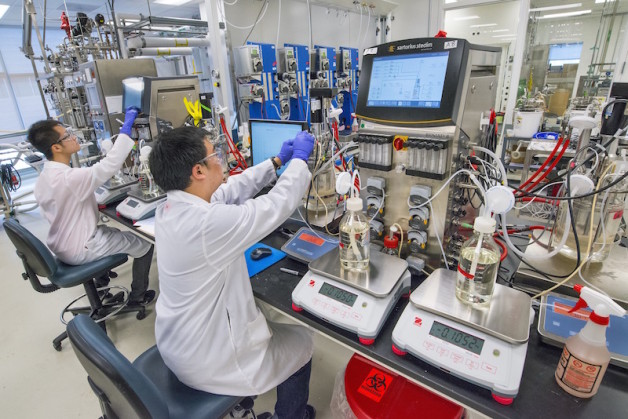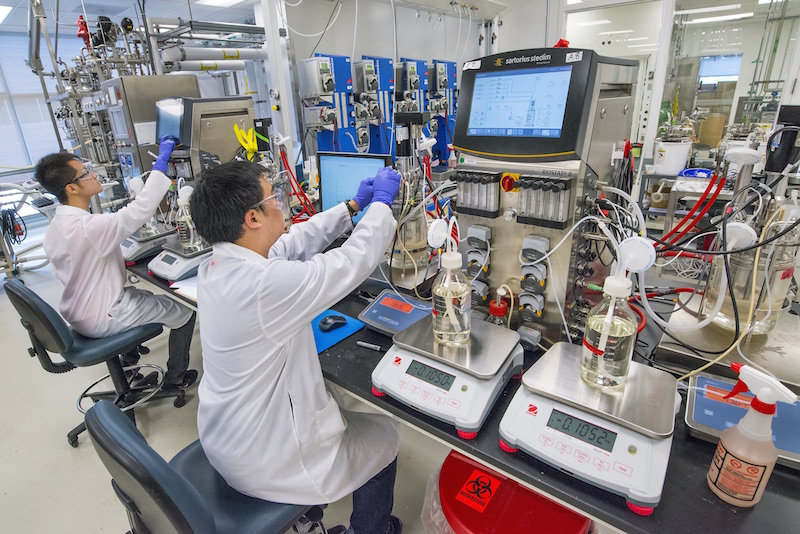Berkeley, CA – Lawrence Berkeley National Laboratory (Berkeley Lab) will partner with four clean energy small businesses to accelerate the commercialization of their innovative bioenergy, buildings and vehicle technologies as part of the Small Business Vouchers (SBV) pilot launched in July 2015 by the U.S. Department of Energy (DOE).
The SBV pilot is a collaborative national effort that will provide up to $20 million in vouchers to eligible small businesses across nine energy technology areas (advanced manufacturing, buildings, bioenergy, fuel cells, solar, fuel cells, geothermal, vehicles, water, and wind). The goal of the pilot is to provide access to world-class laboratory resources to help move innovative ideas and technologies in clean energy closer to scalable commercialization.

The Advanced Biofuels Process Demonstration Unit (ABPDU), a new manufacturing demonstration facility, is one of the resources at Berkeley Lab available to small businesses under the Small Business Voucher pilot. (Credit: Roy Kaltschmidt/Berkeley Lab)
“The Department of Energy is firmly committed to maximizing the impact of the national lab system on the clean energy economy,” said David Danielson, Assistant Secretary for Energy Efficiency and Renewable Energy. “The Small Business Vouchers pilot allows innovative entrepreneurs greater access to the world-class resources and brilliant minds in our labs. These partnerships can help small businesses solve their most pressing technical challenges—and help bring clean energy technologies to commercialization much faster.”
The DOE Office of Energy Efficiency and Renewable Energy will invest nearly $6.7 million in this first round of projects. A total of 33 small businesses were selected to participate in the first round of DOE’s new pilot.
“History has shown that the combination of world-class research and our U.S. entrepreneurial ecosystem has led to world-changing industries; this pilot has offered small businesses across the U.S. access to partnership with DOE and its network of national laboratories,” said Ramamoorthy Ramesh, Berkeley Lab’s Associate Lab Director for the Energy Technologies Area. “Berkeley Lab is excited to engage with such talented small businesses to help bring their technologies to the next stage of commercialization.”
Individual vouchers range from $50,000 to $300,000 per small business, and can be used to perform collaborative research or access lab equipment or facilities. Round 1 voucher awardees to partner with Berkeley Lab include:
XG Sciences, Inc. of Lansing, Michigan has developed advanced materials for lithium-ion batteries and will partner with Berkeley Lab to perform investigations to optimize and improve performance of their silicon/graphene composite anode materials to help enhance next generation high-energy Li-ion batteries.
Lucid Design Group of Oakland, California is partnering with Berkeley Lab’s experts in physics-based tools to integrate a range of datasets into an energy efficiency tool that will provide diagnostic insights into buildings that typically suffer from patchy analytical data.
Envia Systems of Newark, California, will use Berkeley Lab’s research facilities and advanced imaging techniques to better understand the material structures of silicon-based anode and the HCMRTM cathode materials. These materials show great promise as key components for the next generation of high-energy lithium ion cells for transportation applications.
Lygos, Inc. of Emeryville, California is seeking to overcome challenges in scaling up their biological-based process that produces malonic acid and will use the Advanced Biofuels Process Demonstration Unit (ABPDU), a new manufacturing demonstration facility at Berkeley Lab, to conduct the necessary testing to overcome current barriers. Large-scale fermentation vessels at DOE’s National Renewable Energy Laboratory will also be utilized to produce the biomass-derived products for testing. Biomass sugar-derived process is cost-effective, and makes large-scale manufacturing possible as this technology moves forward with commercialization.
DOE also announced that it will start accepting applications for Round 2 of the SBV starting March 10. Up to $13 million in funding remains and up to 100 vouchers will be awarded. To learn more about the Small Business Vouchers Pilot and see a full list of small businesses competitively selected under Round 1, please visit www.SBV.org.
# # #
Lawrence Berkeley National Laboratory addresses the world’s most urgent scientific challenges by advancing sustainable energy, protecting human health, creating new materials, and revealing the origin and fate of the universe. Founded in 1931, Berkeley Lab’s scientific expertise has been recognized with 13 Nobel prizes. The University of California manages Berkeley Lab for the U.S. Department of Energy’s Office of Science. For more, visit www.lbl.gov.
DOE’s Office of Science is the single largest supporter of basic research in the physical sciences in the United States, and is working to address some of the most pressing challenges of our time. For more information, please visit science.energy.gov.
Program contact:
Jodi Bellacicco, 510-486-5445
